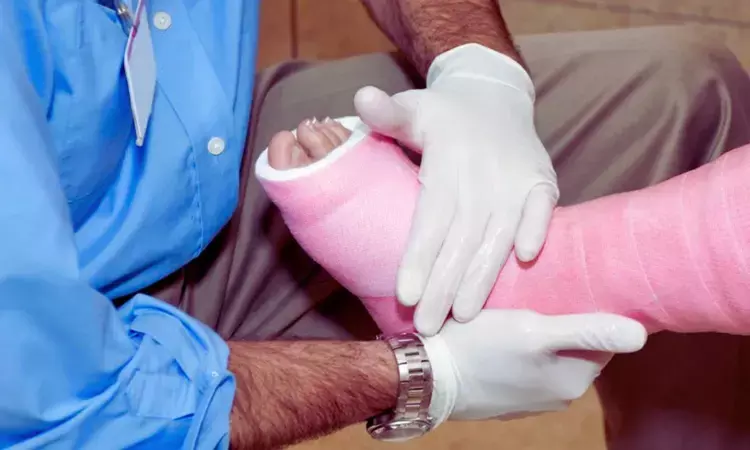- Home
- Medical news & Guidelines
- Anesthesiology
- Cardiology and CTVS
- Critical Care
- Dentistry
- Dermatology
- Diabetes and Endocrinology
- ENT
- Gastroenterology
- Medicine
- Nephrology
- Neurology
- Obstretics-Gynaecology
- Oncology
- Ophthalmology
- Orthopaedics
- Pediatrics-Neonatology
- Psychiatry
- Pulmonology
- Radiology
- Surgery
- Urology
- Laboratory Medicine
- Diet
- Nursing
- Paramedical
- Physiotherapy
- Health news
- Fact Check
- Bone Health Fact Check
- Brain Health Fact Check
- Cancer Related Fact Check
- Child Care Fact Check
- Dental and oral health fact check
- Diabetes and metabolic health fact check
- Diet and Nutrition Fact Check
- Eye and ENT Care Fact Check
- Fitness fact check
- Gut health fact check
- Heart health fact check
- Kidney health fact check
- Medical education fact check
- Men's health fact check
- Respiratory fact check
- Skin and hair care fact check
- Vaccine and Immunization fact check
- Women's health fact check
- AYUSH
- State News
- Andaman and Nicobar Islands
- Andhra Pradesh
- Arunachal Pradesh
- Assam
- Bihar
- Chandigarh
- Chattisgarh
- Dadra and Nagar Haveli
- Daman and Diu
- Delhi
- Goa
- Gujarat
- Haryana
- Himachal Pradesh
- Jammu & Kashmir
- Jharkhand
- Karnataka
- Kerala
- Ladakh
- Lakshadweep
- Madhya Pradesh
- Maharashtra
- Manipur
- Meghalaya
- Mizoram
- Nagaland
- Odisha
- Puducherry
- Punjab
- Rajasthan
- Sikkim
- Tamil Nadu
- Telangana
- Tripura
- Uttar Pradesh
- Uttrakhand
- West Bengal
- Medical Education
- Industry
Indian Researchers Demonstrate Accelerated Healing with Platelet-Rich Fibrin in Open Tibial Fractures

India: A recent randomized comparative pilot study, published online in Apollo Medicine has highlighted the potential of platelet-rich fibrin (PRF) in managing open tibial fractures. The study aimed to evaluate the role of PRF in wound healing and fracture union, offering new insights into its application in human orthopedics.
The researchers revealed that the results of injectable PRF at the fracture site and PRF gel applied over the wound were encouraging. They found PRF to be a safe option, demonstrating faster wound healing and improved fracture union in the small sample size of this pilot study.
Dr. Subhashis Mandal, from the Department of Orthopaedics at Maulana Azad Medical College and Associated Lok Nayak Hospital in New Delhi, Delhi, India, shared key insights with Medical Dialogues: "Our study demonstrates that PRF is a safe and effective option for open fractures, with faster wound healing and higher rates of fracture union compared to conventional treatment. This is particularly important as PRF preparation is simpler and more cost-effective than platelet-rich plasma (PRP), requiring no anti-coagulants or specialized equipment."
Open tibial fractures, particularly in the distal third, are common injuries resulting from road traffic accidents. These fractures are challenging to manage due to their subcutaneous location, limited muscle coverage, and compromised blood supply, which often lead to complications like delayed union, non-union, and infections. This study explored the efficacy of PRF, an orthobiologic rich in growth factors and cytokines, in improving outcomes in such cases.
The researchers enrolled 14 patients with open tibial shaft fractures, randomized into two groups: PRF and non-PRF. In the PRF group, autologous PRF was injected at the fracture site and applied as a gel over the wounds, while the non-PRF group received conventional standard care. Wound assessments were conducted on day 3, day 7, and weekly until complete healing, with radiographic evaluations for fracture union performed at 3, 6, and 12 months.
The findings were promising:
- Fracture union was achieved in 87.5% of cases in the PRF group compared to 50% in the non-PRF group.
- Fractures in the PRF group healed 3–4 weeks earlier than those in the non-PRF group.
- External fixators were removed about a month earlier in the PRF group.
- Although the wound healing time was not statistically significant, it was faster in the PRF group, even with a larger average wound size compared to the non-PRF group.
Dr. Mandal further emphasized the broader implications of the study. "Given the growing interest in orthobiologics, PRF offers a practical alternative for enhancing healing in fractures, particularly open fractures. This study likely marks the first in English literature to show PRF's efficacy in such cases."
Despite its strengths, including the use of randomized groups, the study had limitations. The small sample size restricts the generalizability of the findings. "A multi-center study with a larger cohort would help validate PRF's role in clinical practice," Dr. Mandal suggested.
The study adds to the limited but growing body of literature on PRF's utility in orthopedic practice. With its demonstrated safety, efficacy, and cost-effectiveness, PRF holds significant promise for improving outcomes in open fractures, potentially reducing complications and enhancing recovery in patients.
"Over the past 5 years, the senior author (Dr. Sumit Sural) has conducted other studies with promising results of the use of PRF in fracture union and wound healing. A multi-centric study with a larger sample size would be useful in establishing the role of PRF," Dr. Mandal concluded.
Reference:
Sural, S., & Mandal, S. (2024). Usefulness of Platelet-rich Fibrin in Open Fractures of Tibia: A Randomised Comparative Pilot Study. Apollo Medicine. https://doi.org/10.1177/09760016241277624
Dr Kamal Kant Kohli-MBBS, DTCD- a chest specialist with more than 30 years of practice and a flair for writing clinical articles, Dr Kamal Kant Kohli joined Medical Dialogues as a Chief Editor of Medical News. Besides writing articles, as an editor, he proofreads and verifies all the medical content published on Medical Dialogues including those coming from journals, studies,medical conferences,guidelines etc. Email: drkohli@medicaldialogues.in. Contact no. 011-43720751


